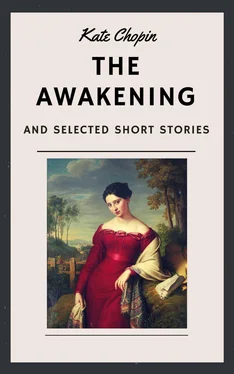Madame Ratignolle, when they had regained her cottage, went in to take the hour's rest which she considered helpful. Before leaving her, Robert begged her pardon for the impatience—he called it rudeness—with which he had received her well-meant caution.
“You made one mistake, Adele,” he said, with a light smile; “there is no earthly possibility of Mrs. Pontellier ever taking me seriously. You should have warned me against taking myself seriously. Your advice might then have carried some weight and given me subject for some reflection. Au revoir. But you look tired,” he added, solicitously. “Would you like a cup of bouillon? Shall I stir you a toddy? Let me mix you a toddy with a drop of Angostura.”
She acceded to the suggestion of bouillon, which was grateful and acceptable. He went himself to the kitchen, which was a building apart from the cottages and lying to the rear of the house. And he himself brought her the golden-brown bouillon, in a dainty Sevres cup, with a flaky cracker or two on the saucer.
She thrust a bare, white arm from the curtain which shielded her open door, and received the cup from his hands. She told him he was a bon garcon, and she meant it. Robert thanked her and turned away toward “the house.”
The lovers were just entering the grounds of the pension. They were leaning toward each other as the wateroaks bent from the sea. There was not a particle of earth beneath their feet. Their heads might have been turned upside-down, so absolutely did they tread upon blue ether. The lady in black, creeping behind them, looked a trifle paler and more jaded than usual. There was no sign of Mrs. Pontellier and the children. Robert scanned the distance for any such apparition. They would doubtless remain away till the dinner hour. The young man ascended to his mother's room. It was situated at the top of the house, made up of odd angles and a queer, sloping ceiling. Two broad dormer windows looked out toward the Gulf, and as far across it as a man's eye might reach. The furnishings of the room were light, cool, and practical.
Madame Lebrun was busily engaged at the sewing-machine. A little black girl sat on the floor, and with her hands worked the treadle of the machine. The Creole woman does not take any chances which may be avoided of imperiling her health.
Robert went over and seated himself on the broad sill of one of the dormer windows. He took a book from his pocket and began energetically to read it, judging by the precision and frequency with which he turned the leaves. The sewing-machine made a resounding clatter in the room; it was of a ponderous, by-gone make. In the lulls, Robert and his mother exchanged bits of desultory conversation.
“Where is Mrs. Pontellier?”
“Down at the beach with the children.”
“I promised to lend her the Goncourt. Don't forget to take it down when you go; it's there on the bookshelf over the small table.” Clatter, clatter, clatter, bang! for the next five or eight minutes.
“Where is Victor going with the rockaway?”
“The rockaway? Victor?”
“Yes; down there in front. He seems to be getting ready to drive away somewhere.”
“Call him.” Clatter, clatter!
Robert uttered a shrill, piercing whistle which might have been heard back at the wharf.
“He won't look up.”
Madame Lebrun flew to the window. She called “Victor!” She waved a handkerchief and called again. The young fellow below got into the vehicle and started the horse off at a gallop.
Madame Lebrun went back to the machine, crimson with annoyance. Victor was the younger son and brother—a tete montee, with a temper which invited violence and a will which no ax could break.
“Whenever you say the word I'm ready to thrash any amount of reason into him that he's able to hold.”
“If your father had only lived!” Clatter, clatter, clatter, clatter, bang! It was a fixed belief with Madame Lebrun that the conduct of the universe and all things pertaining thereto would have been manifestly of a more intelligent and higher order had not Monsieur Lebrun been removed to other spheres during the early years of their married life.
“What do you hear from Montel?” Montel was a middle-aged gentleman whose vain ambition and desire for the past twenty years had been to fill the void which Monsieur Lebrun's taking off had left in the Lebrun household. Clatter, clatter, bang, clatter!
“I have a letter somewhere,” looking in the machine drawer and finding the letter in the bottom of the workbasket. “He says to tell you he will be in Vera Cruz the beginning of next month,”—clatter, clatter!—“and if you still have the intention of joining him”—bang! clatter, clatter, bang!
“Why didn't you tell me so before, mother? You know I wanted—” Clatter, clatter, clatter!
“Do you see Mrs. Pontellier starting back with the children? She will be in late to luncheon again. She never starts to get ready for luncheon till the last minute.” Clatter, clatter! “Where are you going?”
“Where did you say the Goncourt was?”
Every light in the hall was ablaze; every lamp turned as high as it could be without smoking the chimney or threatening explosion. The lamps were fixed at intervals against the wall, encircling the whole room. Some one had gathered orange and lemon branches, and with these fashioned graceful festoons between. The dark green of the branches stood out and glistened against the white muslin curtains which draped the windows, and which puffed, floated, and flapped at the capricious will of a stiff breeze that swept up from the Gulf.
It was Saturday night a few weeks after the intimate conversation held between Robert and Madame Ratignolle on their way from the beach. An unusual number of husbands, fathers, and friends had come down to stay over Sunday; and they were being suitably entertained by their families, with the material help of Madame Lebrun. The dining tables had all been removed to one end of the hall, and the chairs ranged about in rows and in clusters. Each little family group had had its say and exchanged its domestic gossip earlier in the evening. There was now an apparent disposition to relax; to widen the circle of confidences and give a more general tone to the conversation.
Many of the children had been permitted to sit up beyond their usual bedtime. A small band of them were lying on their stomachs on the floor looking at the colored sheets of the comic papers which Mr. Pontellier had brought down. The little Pontellier boys were permitting them to do so, and making their authority felt.
Music, dancing, and a recitation or two were the entertainments furnished, or rather, offered. But there was nothing systematic about the programme, no appearance of prearrangement nor even premeditation.
At an early hour in the evening the Farival twins were prevailed upon to play the piano. They were girls of fourteen, always clad in the Virgin's colors, blue and white, having been dedicated to the Blessed Virgin at their baptism. They played a duet from “Zampa,” and at the earnest solicitation of every one present followed it with the overture to “The Poet and the Peasant.”
“Allez vous-en! Sapristi!” shrieked the parrot outside the door. He was the only being present who possessed sufficient candor to admit that he was not listening to these gracious performances for the first time that summer. Old Monsieur Farival, grandfather of the twins, grew indignant over the interruption, and insisted upon having the bird removed and consigned to regions of darkness. Victor Lebrun objected; and his decrees were as immutable as those of Fate. The parrot fortunately offered no further interruption to the entertainment, the whole venom of his nature apparently having been cherished up and hurled against the twins in that one impetuous outburst.
Читать дальше












